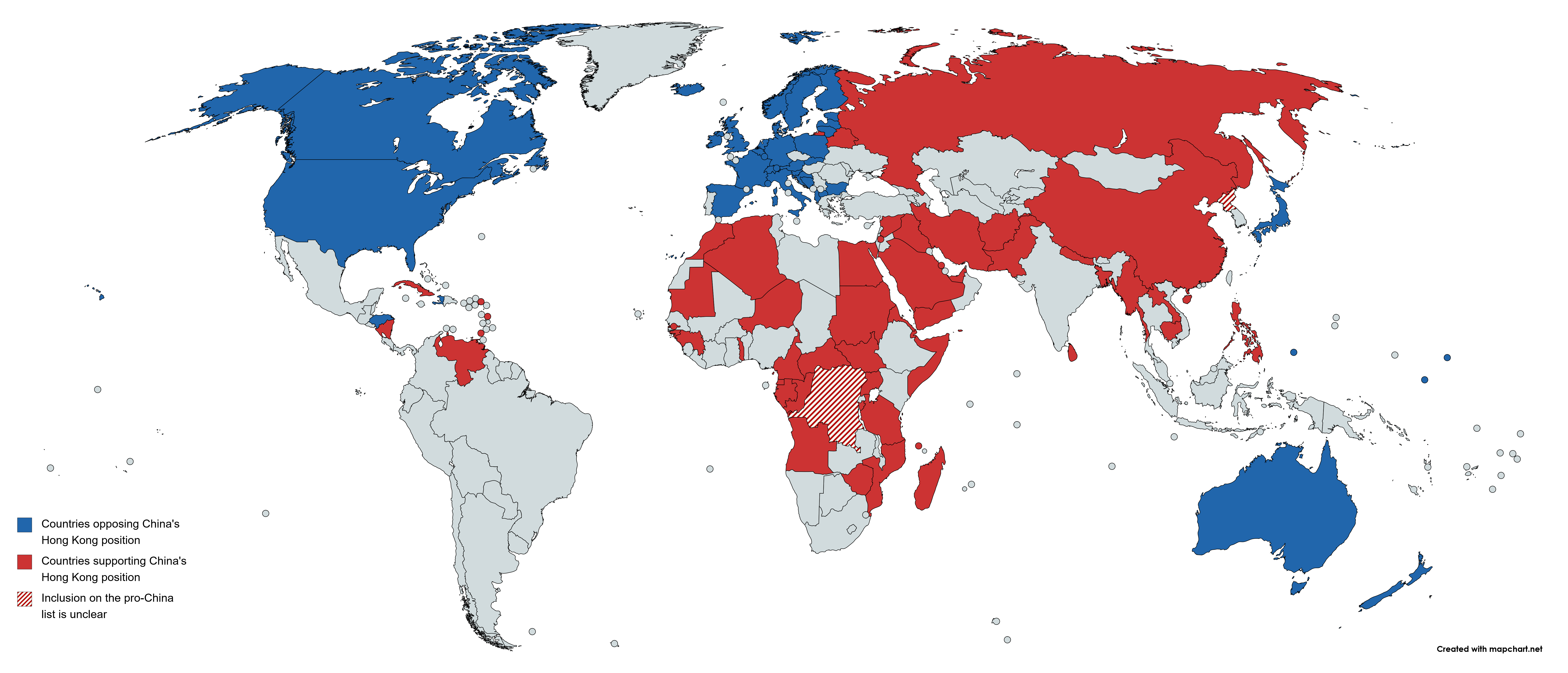On Tuesday, the United Nations was treated to another clash between China’s critics and its supporters. As my colleague Catherine Putz noted, on October 6 “German Ambassador Christoph Heusgen presented a statement to the U.N., within the context of the General Assembly’s Third Committee (on Social, Humanitarian and Cultural Issues) on behalf of 39 countries,” criticizing China for “the human rights situation in Xinjiang and the recent developments in Hong Kong.” China had two of its staunchest supporters, Pakistan and Cuba, lined up to refute those remarks immediately afterward, by giving their own lists of countries backing China.
Interestingly, while the German bloc was united in calling themselves “gravely concerned” about both issues, China had to divide its supporters into two groups: countries that explicitly backed its Hong Kong policy and countries that supported its Xinjiang policy. As you would expect, there is a great deal of overlap between those two, but the differences are telling. (Putz gives an overview of the Xinjiang signatories in her analysis, along with a comparison to the 2019 lists of countries expressing concern vs. support.)
For reference, here are the two blocs:
Heusgen listed 39 countries expressing concern about China’s Hong Kong policy: Albania, Australia, Austria, Belgium, Bosnia and Herzegovina, Bulgaria, Canada, Croatia, Denmark, Estonia, Finland, France, Germany, Haiti, Honduras, Iceland, Ireland, Italy, Japan, Latvia, Liechtenstein, Lithuania, Luxembourg, the Republic of the Marshall Islands, Monaco, Nauru, the Kingdom of the Netherlands, New Zealand, North Macedonia, Norway, Palau, Poland, Slovakia, Slovenia, Spain, Sweden, Switzerland, the United Kingdom, and the United States.
In response, Pakistan’s permanent representative to the United Nations, Munir Akram, read a statement from a group of 54* countries backing China’s Hong Kong policy: Afghanistan, Algeria, Angola, Antigua and Barbuda, Bahrain, Bangladesh, Belarus, Burundi, Cambodia, Cameroon, the Central African Republic, China, Comoros, Congo, Cuba, Djibouti, Dominica, Egypt, Equatorial Guinea, Eritrea, Gabon, Grenada, Gambia, Guinea, Guinea Bissau, Iran, Iraq, Laos, Madagascar, Mauritania, Morocco, Mozambique, Myanmar, Nepal, Nicaragua, Niger, Pakistan, Palestine, Philippines, Russia, Somalia, Saudi Arabia, South Sudan, Sri Lanka, Sudan, Syria, Tanzania, Togo, Uganda, the United Arab Emirates, Venezuela, Yemen, and Zimbabwe.
*There’s confusion over one country on the list; Akram says “The Democratic Republic of Korea” right after “Cuba.” That could conceivably refer to either the Democratic People’s Republic of Korea (DPRK, North Korea) of the Democratic Republic of Congo (DRC). Both countries have backed China in similar statements in the past. Interestingly, the exact same mistake occurred in the Cuban representative’s separate list of countries that support China’s Xinjiang policies.
 Also for reference, Akram’s full statement, as transcribed from the U.N. video recording of the meeting (starting at around 27:30), is as follows:
Also for reference, Akram’s full statement, as transcribed from the U.N. video recording of the meeting (starting at around 27:30), is as follows:
Non-interference in the internal affairs of sovereign states is an important principle enshrined in the Charter of the United Nations and a basic norm of international relations. The Hong Kong Special Administrative Region is an inalienable part of China and Hong Kong affairs are China’s internal affairs that brook no interference by foreign forces. We support China’s implementation of “one country, two systems” in the Hong Kong Special Administrative Region.
In any country, the legislative power on national security issues rests with the state. The enactment of the Law of the People’s Republic of China on Safeguarding National Security in the Hong Kong Special Administrative Region is a legitimate measure that ensures “one country, two systems” goes steady and enduring and that Hong Kong enjoy long-term prosperity and stability. The legitimate rights and freedoms of Hong Kong residents can be better exercised in a safe environment.
There are a few takeaways from the list of countries that signed on to the above statement. First, as is typical, China’s supporters are overwhelmingly clustered in the developing world, and particularly in Africa. Of the 54 countries that joined the statement, 27 were African (or 28, if Akram meant to include the DRC). In other words, half of the total number of countries on the continent backed China in this instance (and, tellingly, none signed the German statement). Outside of Africa, China has its strongest support in the broader Middle East, where eight countries signed on; notably, Beijing was able to attract both Iran and Saudi Arabia to its side of the Hong Kong issue. In South Asia, five of the eight SAARC members were on board (with Bhutan, India, and the Maldives as the exceptions).
In other regions, however, China had fewer supporters. Surprisingly, not a single country from Central Asia signed on. Southeast Asia, too, was under-represented, with just four (Cambodia, Laos, Myanmar, and the Philippines) of the region’s 11 countries on the list. Based on the statement, Latin America and the Pacific are regions where China’s diplomatic clout is still limited, with just a handful of smaller countries on its side. On the other hand, China was apparently able to keep many (though by no means all) of the countries in Central and Eastern Europe from signing on to the German-sponsored statement opposing its Hong Kong and Xinjiang policies – although Beijing was apparently not able to persuade them to sign on to Pakistan’s counter statement either (with the lone exception of Belarus).
Finally, it’s noteworthy that China was not able to convince all of the countries to back both its Hong Kong and Xinjiang policies. The Hong Kong statement had 54 countries sign on; as Putz noted, only 45 did the same for the pro-China statement on Xinjiang. Ten countries backed China’s policies on Hong Kong but not on Xinjiang: Afghanistan, Algeria, Antigua and Barbuda, Bangladesh, Djibouti, Gambia, Mauritania, Niger, the Philippines, and Somalia. Just one country did the opposite: Kiribati, which signed the Xinjiang statement but not the one on Hong Kong. Notably, many of those 10 countries are either Muslim-majority states or have sizable Muslim minorities (with Antigua and Barbuda as the lone exception).
To that end, the Pakistani daily Dawn noted that there’s a reason Pakistan, China’s “iron brother,” read the statement on Hong Kong rather than the one on Xinjiang: “The decision not to ask a Muslim country to lead the support group on Xinjiang reflects Beijing’s awareness of the sensitivities associated with this issue. It would have been embarrassing for Muslim nations to take a public position on a Muslim majority region.” (Pakistan did sign the Xinjiang statement, of course, but avoided reading it aloud into the U.N. record.)
Clearly it is easier for China to muster support on Hong Kong as a sovereignty issue than it is to win backers for its increasingly criticized treatment of the Uyghurs. If Germany had similarly bifurcated its statement – having one on Hong Kong and a separate one on Xinjiang, rather than combining both — it’s interesting to consider which countries might have signed on to the latter alone.

































